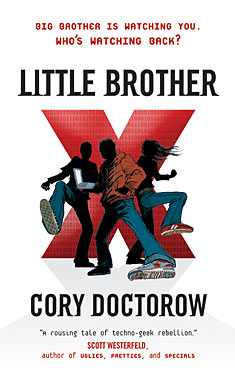Cory Doctorow
Completed 6/21/2014, Reviewed 7/1/2014
5 stars
While deep in the middle of my TBR list of 56 books, my
partner showed me the library copy of “Little Brother” he just finished. He told me I needed to read it before he
takes it back. I told him I was a little
hesitant about Cory Doctorow because I had heard he wrote cyberpunk. He told me to ignore that and just read
it. I did. Wow!
The setting is post-9/11 San Francisco. A teen hacker and a few of his friends cut
class and head into the city to play an ARG, i.e., and Alternative Reality
Game. Terrorists bomb one of the bridges
and the teens are picked up as persons of interest. Caught in the wrong place at the wrong time,
they are subject to severe interrogations.
All but one are eventually released.
They are threatened to never tell anyone what happened to them, then released. Once back, they realize just how much
homeland security has its nose in almost every aspect of their lives. Marcus, the main character, decides he has to
do something and starts a quiet revolution that spreads through the entire
youth hacker/gamer community.
Doctorow’s not-so-young-adult novel shows us just how close
we were/are to a totalitarian society, not unlike “1984”. He makes no bones about his fear of our
giving up our rights for the sake of fighting terrorism. He covers a lot of
very technical concepts related to the freedom versus surveillance of liberty
and data, but does so with very readable prose for the less technical, and in a
way that blends right into the first-person narration by Marcus. Where sometimes Orwell could get quite dry,
Doctorow’s prose is very readable. It’s
not overly literary; it’s raw and direct.
The character of Marcus is very well drawn. I’ve read some reviews criticizing how the supporting
characters range from somewhat to very cardboard. However, I think it makes sense from the
perspective of a teenager. For that
matter, how many of us reduce those who threaten us to soul-less, unfeeling caricatures
of real people. I don’t want to sound
like I’m justifying weak characterization.
I think in the context of the narrative, it makes a lot of sense.
I had the opportunity to see Cory Doctorow at our city’s
Public Library. He gave a talk about
many of the internet security issues he incorporated into this book. It was like getting a book report of “Little
Brother” without mentioning any of the characters. Interestingly, I found myself less than
enthralled by the lecture than I was by the novel. “Little Brother” presents the scary nature of
internet security in the context of a very realistic scenario. It had more impact on me than his passionate
delivery at the podium.
I had a tough time writing this review, finding it extremely
difficult to articulate the experience I had reading the book. Even after many days of reflecting on it, I
stumbled trying to quantify its positive qualities. So subjectively, I’ll summarize with this: This is an important and timely novel. It deals with concepts that I think we often
relegate to the paranoid survivalists. It
reminds us of the power of fear. And it
inspires us to make the effort to make a difference. Five stars.

No comments:
Post a Comment